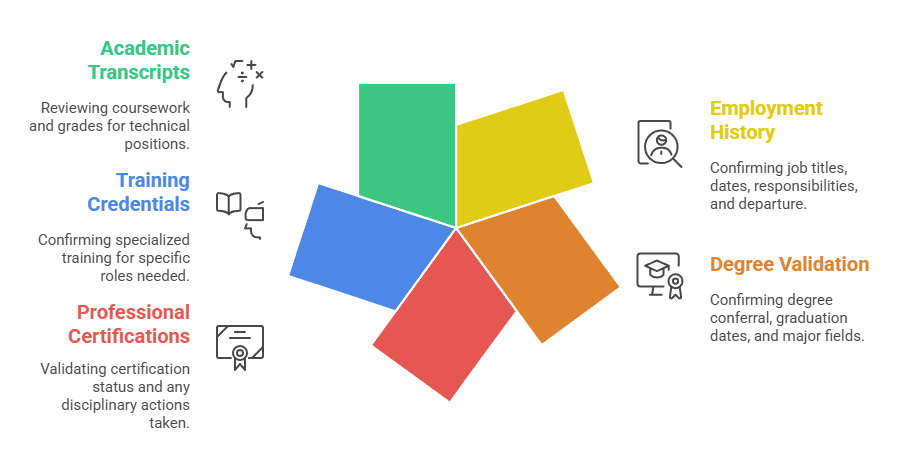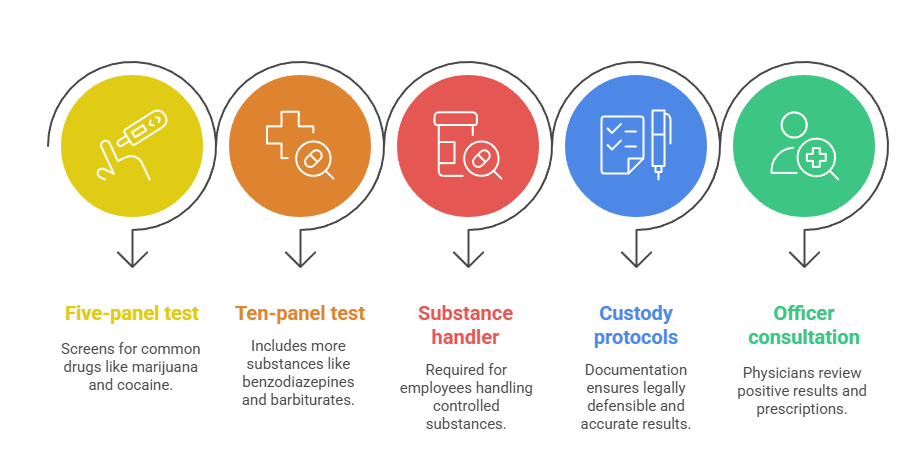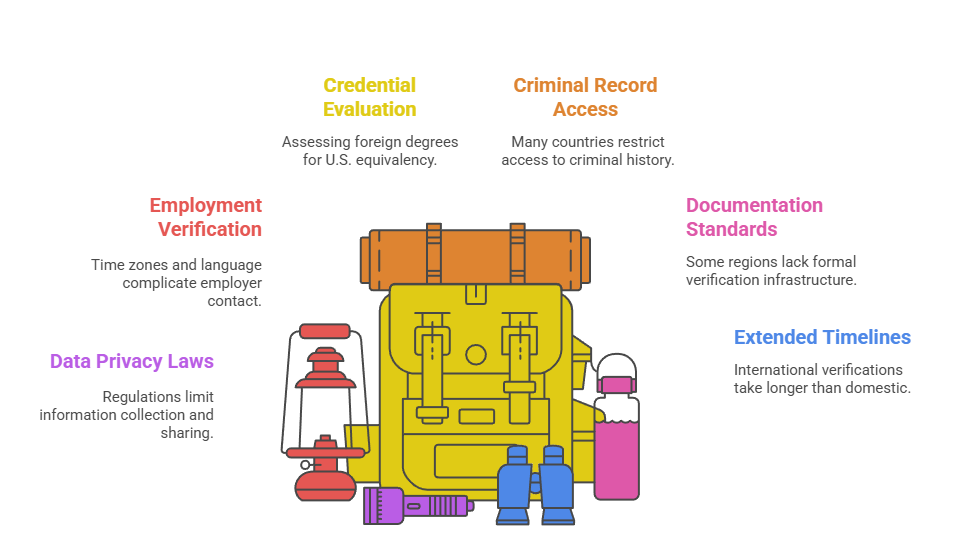Washington's biotech sector presents unique screening challenges where traditional FDA compliance requirements intersect with Silicon Valley's rapid hiring culture, creating demand for specialized background verification solutions. This guide provides comprehensive information on navigating employment screening requirements in Washington's emerging life sciences corridor while maintaining regulatory compliance and hiring velocity.
Key Takeaways
- Washington biotech companies must balance FDA regulatory compliance with tech-industry hiring speed, requiring specialized screening approaches that address both demands.
- Employment background checks in Washington life sciences typically include criminal history, employment verification, education confirmation, and professional license validation.
- State-specific laws like the Fair Chance Act restrict how employers use criminal records in hiring decisions, impacting biotech screening protocols.
- Tech-bio convergence creates screening complexities unique to Washington's innovation corridor, where software engineers transition into regulated life sciences roles.
- Pre-employment drug testing remains standard for positions involving controlled substances, laboratory work, or direct patient care within pharmaceutical companies.
- International candidate screening poses particular challenges for Seattle biotech firms recruiting global talent, requiring specialized verification processes.
- Professional reference checks help assess cultural fit and technical competencies beyond what standard background screenings reveal.
- Continuous monitoring programs enable ongoing compliance verification for employees in sensitive research positions or FDA-regulated manufacturing roles.
Understanding Washington's Biotech Industry Landscape
Washington State has emerged as a major biotech hub, with Seattle ranking among the top ten U.S. cities for life sciences employment in 2025. The region hosts over 400 biotech companies, ranging from established pharmaceutical manufacturers to cutting-edge computational biology startups. This convergence of traditional life sciences with technology innovation creates a unique employment ecosystem where rapid scaling meets strict regulatory oversight.
The tech-bio crossover defines Washington's competitive advantage in the life sciences sector. Companies like those developing AI-driven drug discovery platforms or digital therapeutics solutions require talent that bridges multiple disciplines. These hybrid organizations face screening challenges that traditional biotech HR frameworks weren't designed to address, particularly when hiring software engineers, data scientists, or cloud infrastructure specialists for FDA-regulated environments.
Understanding this landscape is critical for developing effective screening strategies. Washington employers must navigate federal regulations governing pharmaceutical manufacturing, clinical research, and controlled substance handling while also addressing state-specific employment laws. Additionally, the competitive talent market means screening processes must be efficient enough to secure top candidates without compromising compliance standards that protect patient safety and research integrity.
Federal Compliance Requirements for Biotech Screening
FDA-regulated facilities face specific employment screening obligations that extend beyond standard background checks. The Food and Drug Administration requires current Good Manufacturing Practice (cGMP) compliance, which includes verifying that employees possess appropriate education, training, and experience for their assigned functions. Personnel qualifications documentation becomes a critical component of regulatory inspections, making thorough screening essential for maintaining manufacturing licenses.
Clinical research organizations conducting FDA-regulated studies must comply with Good Clinical Practice (GCP) guidelines. These standards require verification of principal investigator credentials, clinical coordinator qualifications, and support staff training records. Background screening for research positions therefore includes specialized elements like medical license verification, IRB training certification, and previous clinical trial experience validation.
Controlled substance handling creates additional screening layers for pharmaceutical companies. The Drug Enforcement Administration mandates background checks for employees with access to Schedule II-V controlled substances used in drug manufacturing or research. These DEA-focused screenings examine criminal history with particular attention to drug-related offenses, diversion incidents, or convictions that would disqualify individuals from handling regulated substances under federal law.
Washington State-Specific Screening Regulations

Fair Chance Act Requirements
Washington's Fair Chance Act significantly restricts how employers use criminal records in hiring decisions. Employers cannot inquire about criminal history on initial applications or during preliminary interviews. Only after making a conditional offer can companies conduct criminal background checks, and even then, they must follow specific adverse action procedures before withdrawing employment offers based on conviction records.
The law requires individualized assessments when criminal history is discovered. Employers must consider the nature of the offense, time elapsed since the conviction, and the relationship between the criminal conduct and job responsibilities. For biotech positions involving patient care, controlled substance access, or vulnerable population interaction, relevant convictions may justify employment denial, but blanket policies excluding all candidates with criminal records violate Washington law.
Data Privacy and Consent Requirements
Washington's evolving data privacy landscape impacts how companies collect and use background screening information. Employers must obtain written authorization before conducting background checks, clearly disclosing what information will be collected and how it will be used. The authorization form must be a standalone document, not buried within general employment applications or offer letters.
Candidates have specific rights regarding background check results under both federal and state law. If adverse action is taken based on screening results, employers must provide pre-adverse action notices allowing applicants to review and dispute inaccurate information. Washington employers must also maintain strict confidentiality of background check reports, limiting access only to personnel with legitimate business needs for the information.
Essential Screening Components for Washington Biotech

Criminal Background Checks
Criminal history screening forms the foundation of biotech employment verification, but the scope and interpretation vary based on position requirements. Entry-level laboratory positions typically require seven-year county and statewide criminal searches. Senior roles involving controlled substance access, clinical oversight, or executive authority often warrant more comprehensive screening including federal criminal databases and extended look-back periods beyond seven years where legally permissible.
Washington biotech companies must navigate the tension between thorough criminal screening and Fair Chance Act compliance. Best practices include conducting criminal checks only after conditional offers, evaluating convictions based on relevance to specific job functions, and documenting individualized assessment processes. For regulated positions where criminal history legitimately impacts job performance, employers should clearly articulate these requirements in job descriptions before the application stage.
Employment and Education Verification
Accurate credential verification is critical in biotech where technical expertise directly impacts product safety and research validity. Employment verification confirms previous positions, dates of employment, and job responsibilities while education verification validates degrees, certificates, and specialized training credentials that candidates claim. For scientific positions, verifying educational credentials from accredited institutions prevents "diploma mill" fraud that could compromise research integrity.

- Employment history confirmation: Previous employer contacts verify job titles, employment dates, responsibilities, and departure circumstances
- Degree validation: Direct contact with registrar offices confirms degree conferral, graduation dates, and major fields of study
- Professional certifications: Verification through issuing organizations validates current certification status and any disciplinary actions
- Training credentials: Confirmation of specialized training like GCP, GMP, or laboratory safety certifications required for specific roles
- Academic transcripts: Review of coursework and grades for positions requiring specific technical knowledge or advanced degrees
Professional license verification adds another verification layer for regulated roles. Pharmacist licenses, clinical laboratory scientist certifications, medical licenses, and other professional credentials require validation through state licensing boards. Washington biotech employers should verify both current license status and any disciplinary actions or restrictions that might impact job performance.
Drug Testing Protocols
Pre-employment drug screening remains standard practice in Washington life sciences, despite the state's legal recreational marijuana framework. Federal contractors and FDA-regulated manufacturers often maintain drug-free workplace policies that include marijuana testing, even though state law protects off-duty cannabis use in many employment contexts. Biotech companies must clearly communicate drug testing policies during the hiring process to avoid candidate surprise or legal challenges.

- Five-panel standard test: Screens for marijuana, cocaine, opiates, amphetamines, and PCP for most general laboratory positions
- Ten-panel enhanced test: Adds benzodiazepines, barbiturates, methadone, propoxyphene, and quaaludes for sensitive manufacturing roles
- Controlled substance handler screening: Comprehensive panels required for employees with direct access to Schedule II-V substances
- Chain of custody protocols: Proper documentation and handling procedures ensure legally defensible test results
- Medical review officer consultation: Licensed physicians review positive results to identify legitimate prescription medication use
The screening panel should align with position requirements and federal obligations. Positions involving controlled substance manufacturing or handling typically require more comprehensive screening. All drug testing must comply with proper chain-of-custody procedures and use certified laboratories to ensure defensible results.
Tech-Bio Convergence Screening Challenges
The intersection of technology and biotechnology creates unique screening complexities for Washington employers. Software engineers joining pharmaceutical companies may lack familiarity with FDA regulatory culture, while traditionally trained biologists transitioning into computational roles might not understand cybersecurity requirements. Background screening must therefore evaluate both technical competencies and regulatory aptitude, assessing whether candidates can operate effectively in this hybrid environment.
Data security concerns elevate the importance of comprehensive screening for technology roles within biotech companies. Intellectual property protection, patient data privacy under HIPAA, and research confidentiality all depend on trustworthy personnel with appropriate security awareness. Criminal background checks should specifically examine fraud, identity theft, corporate espionage, and cybercrime convictions. Reference checks should probe candidates' understanding of confidentiality obligations and their track record handling sensitive information.
Remote work trends compound screening challenges for distributed biotech teams. Washington companies hiring remote data scientists, bioinformatics specialists, or computational chemists must verify credentials across state lines while ensuring consistent screening standards. International remote hiring adds complexity with varying background check availability, data privacy regulations like GDPR affecting European candidates, and the need for specialized international screening providers who understand cross-border verification nuances.
International Candidate Screening
Global Talent Verification Challenges
Seattle's biotech sector attracts significant international talent, creating specialized screening requirements that traditional domestic background checks don't address. Foreign education verification requires evaluation services that confirm degree equivalency to U.S. standards, while international criminal background checks face availability limitations since many countries restrict access to criminal records or lack centralized databases.

- Credential evaluation services: Specialized providers assess foreign degrees and determine U.S. educational equivalency for visa and hiring purposes
- Limited criminal record access: Many countries prohibit releasing criminal history to foreign employers or lack searchable databases
- Employment verification barriers: Time zones, language differences, and varying disclosure norms complicate previous employer contact
- Documentation standards variation: Some regions lack formal employment verification infrastructure common in the United States
- Data privacy law restrictions: Regulations like GDPR limit what information can be collected and shared about European candidates
- Extended timelines: International verifications typically require 2-4 weeks versus 3-5 days for domestic screening
Employers must work with screening providers experienced in navigating these international verification challenges. Reference checks across time zones, language barriers, and varying cultural norms around employment verification require specialized approaches that domestic-only screening companies may not possess.
Immigration Compliance Integration
Background screening must integrate seamlessly with I-9 employment eligibility verification and immigration sponsorship processes. Timing coordination is critical—comprehensive background checks shouldn't delay time-sensitive visa applications, yet companies can't onboard employees before completing required screening. Specialized screening providers familiar with immigration timelines help biotech companies navigate these competing demands.
Right-to-work verification for international candidates requires specialized documentation beyond standard background checks. H-1B visa holders, permanent residents, and employment authorization document holders each have specific verification requirements. Washington biotech employers should implement systems that track work authorization expiration dates, ensuring continuous compliance throughout employment. This ongoing monitoring prevents inadvertent violations that could jeopardize both the company's immigration sponsorship privileges and individual employees' legal status.
Specialized Biotech Position Screening
| Position Category | Core Screening Requirements | Specialized Verifications |
| Laboratory Technicians | Criminal history, employment verification, education confirmation | Safety training validation, previous lab experience, technical skill assessment |
| Manufacturing Personnel | Standard background check, drug testing, reference checks | cGMP training certification, quality system knowledge, FDA inspection history review |
| Clinical Research Staff | Criminal background, education verification, license validation | GCP training, IRB certification, previous clinical trial experience, ethical judgment assessment |
| Executive Leadership | Comprehensive criminal check, employment history, education | Financial background review, litigation search, media reputation assessment, board reference checks |
| Quality/Regulatory Affairs | Standard screening components, professional references | Regulatory submission experience, FDA interaction history, compliance track record verification |
| Data Science/IT Roles | Criminal history with cybercrime focus, employment verification | Security clearance where applicable, confidentiality track record, intellectual property handling assessment |
Different biotech roles require tailored screening approaches based on regulatory exposure, patient safety implications, and intellectual property access. These specialized screening protocols ensure that verification depth matches position sensitivity while maintaining efficient hiring processes for roles with lower regulatory risk.
Building Compliant Screening Programs
Developing Standard Operating Procedures
Effective biotech screening programs require documented standard operating procedures that ensure consistency, compliance, and defensibility. SOPs should specify screening components required for each position category, timing expectations, escalation procedures for concerning findings, and adverse action protocols. Documentation standards must align with FDA expectations for personnel qualification records while also satisfying employment law requirements for background screening processes.
Quality control measures ensure screening program integrity over time. Regular audits should verify that all new hires received appropriate background checks, results were properly documented, and any adverse findings were handled according to established procedures. Periodic policy reviews ensure that screening protocols remain current with evolving regulations, emerging risks, and organizational needs as the company grows or enters new therapeutic areas.
Vendor Selection and Management
Choosing the right background screening provider significantly impacts program effectiveness, particularly for biotech companies with specialized compliance requirements. Biotech-specialized vendors understand FDA requirements, controlled substance screening nuances, and scientific credential verification complexities that generalist screening companies may overlook.
- Industry experience: Track record serving life sciences companies with FDA-regulated operations and controlled substance handling
- International capabilities: Ability to verify credentials and conduct background checks across multiple countries for global talent
- Turnaround times: Speed of service that enables competitive hiring while maintaining thoroughness and accuracy
- Technology platform: User-friendly systems with candidate self-service portals, real-time status updates, and compliance documentation
- Customer support: Responsive service teams that understand biotech-specific challenges and provide consultation on complex screening scenarios
- Pricing transparency: Clear fee structures without hidden charges for additional verifications or expedited processing
Ongoing vendor management maintains screening quality and compliance over time. Service level agreements should specify expected turnaround times, accuracy standards, and dispute resolution procedures. Regular performance reviews assess whether the provider meets expectations and identify improvement opportunities.
Continuous Monitoring and Ongoing Compliance
Background screening shouldn't end at hire for positions with ongoing regulatory or safety sensitivity. Continuous monitoring programs provide alerts when employees incur new criminal charges, lose professional licenses, or appear in sanctioned provider databases. This ongoing verification helps biotech companies maintain cGMP compliance, protect controlled substance access, and identify potential insider threats before they impact operations.
Implementation requires careful balancing of risk management benefits against employee privacy considerations. Continuous monitoring should be limited to positions where ongoing verification serves legitimate business purposes—controlled substance handlers, patient-facing roles, or positions with sensitive intellectual property access. Employees must be informed about continuous monitoring during onboarding, with clear communication about what information will be monitored and how findings will be handled.
Re-screening triggers should be established for specific events beyond continuous monitoring alerts. Promotions into sensitive positions, transfers to FDA-regulated facilities, or assignment to clinical trial oversight roles might warrant updated background checks. International assignments, particularly to countries with heightened corruption or economic espionage risks, should prompt enhanced screening. Clear policies specifying re-screening circumstances prevent inconsistent application that could create legal vulnerabilities.
Cost Considerations and ROI
Background screening represents a significant investment for growing biotech companies, but the cost of inadequate screening far exceeds program expenses. Negligent hiring liability, FDA warning letters, controlled substance diversion, intellectual property theft, or clinical trial integrity failures create financial and reputational damage that comprehensive screening prevents. Understanding cost structures and optimizing screening scope helps maximize return on investment.
Basic screening packages typically range from $50-100 per candidate, covering criminal checks, employment verification, and education confirmation. Enhanced screening for senior roles or sensitive positions may cost $200-500, including additional verification layers, extended criminal searches, and comprehensive reference checks. International screening adds $100-300 depending on countries involved and verification availability. These costs should be budgeted as risk management investments rather than mere administrative expenses.
Efficiency optimization reduces costs without compromising quality. Tailoring screening packages to position requirements avoids unnecessary verification for low-risk roles. Technology platforms with candidate self-service portals accelerate information collection. Strong vendor relationships may yield volume discounts or bundled pricing. Streamlined processes reduce time-to-hire costs by moving qualified candidates through screening quickly while maintaining thoroughness for compliance-critical verifications.
Conclusion
Washington's biotech sector requires sophisticated screening approaches that address the unique complexities of tech-bio convergence while maintaining FDA compliance and respecting state employment laws. Successful programs balance thoroughness with efficiency, ensuring that screening protections don't impede the talent acquisition velocity necessary for competitive success. By implementing specialized verification strategies, partnering with experienced providers, and maintaining ongoing compliance monitoring, biotech companies can build trusted teams capable of advancing innovation while protecting patients, research integrity, and organizational reputation. The investment in comprehensive screening programs pays dividends through reduced regulatory risk, protected intellectual property, and high-quality teams that drive scientific breakthroughs.
Frequently Asked Questions
What background checks are required for biotech jobs in Washington?
Washington biotech employers typically require criminal history checks, employment verification, education confirmation, and professional license validation. FDA-regulated positions may need additional screening for controlled substance handling authorization. The specific screening scope depends on job responsibilities, regulatory exposure, and patient safety implications.
How does Washington's Fair Chance Act affect biotech background checks?
The Fair Chance Act prohibits criminal history inquiries until after conditional job offers are made. Employers must conduct individualized assessments of any criminal records discovered, considering offense nature, elapsed time, and job relevance. Blanket exclusions based on criminal history violate the law, even for biotech companies with legitimate safety concerns.
Can Washington biotech companies test for marijuana despite state legalization?
Yes, employers maintaining drug-free workplace policies can still test for marijuana and make employment decisions based on results. Federal contractors and FDA-regulated manufacturers often require marijuana screening despite state legalization. Companies should clearly communicate drug testing policies during the hiring process to avoid candidate confusion.
How long do biotech background checks take in Washington?
Standard background checks typically complete within 3-5 business days. International verifications or professional license checks may extend timelines to 2-3 weeks. Delays occur when candidates have lived in multiple states, attended foreign universities, or when county courts have backlogs affecting criminal record retrieval.
What is continuous monitoring for biotech employees?
Continuous monitoring provides ongoing alerts about new criminal charges, professional license changes, or sanctions database additions for current employees. This approach helps maintain compliance for positions involving controlled substances, patient care, or sensitive research. Employees must be informed about monitoring programs, which should be limited to roles with legitimate ongoing verification needs.
Do Washington biotech startups need the same screening as large companies?
Yes, regulatory requirements apply regardless of company size. Startups working with controlled substances, conducting clinical research, or manufacturing pharmaceuticals face the same FDA compliance obligations as established companies. Early-stage companies should implement proper screening from the beginning rather than retrofitting programs later, which creates compliance gaps and potential liability.
How do you verify international candidates for Seattle biotech positions?
International verification requires specialized providers who can access foreign criminal records where available, validate educational credentials through equivalency services, and conduct employment verification across language and cultural barriers. The process takes longer than domestic screening and may have limitations based on data availability in specific countries.
What screening is needed for remote biotech positions in Washington?
Remote positions require the same screening rigor as on-site roles, with particular attention to data security and confidentiality capabilities. Criminal background checks should examine fraud and cybercrime history. Reference checks should probe candidates' track record with sensitive information handling, especially for roles involving intellectual property, patient data, or proprietary research information.
Additional Resources
- FDA Guidance on Personnel Qualifications
https://www.fda.gov/regulatory-information/search-fda-guidance-documents/cpg-sec-110100-background-checks - Washington State Fair Chance Act Overview
https://www.lni.wa.gov/workers-rights/workplace-complaints/fair-chance-act - Life Sciences Washington Industry Report
https://www.lifescienceswa.org/economic-impact - DEA Requirements for Controlled Substance Handler Screening
https://www.deadiversion.usdoj.gov/drugreg/index.html - FCRA Compliance Guide for Employers
https://www.ftc.gov/business-guidance/resources/using-consumer-reports-what-employers-need-know
